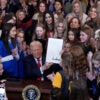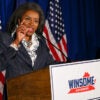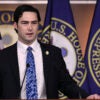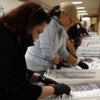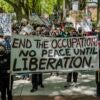
C-SPAN does not cover many federal appellate courts hearings. On Monday, in Perry v. Schwarzenegger, the case involving the constitutionality of California’s voter-approved Prop 8, the cable public service provider made a not-at-all surprising exception.
Before a three-judge panel in a San Francisco courthouse, defenders of traditional marriage squared off against proponents of inventing a new federal constitutional right to marry a person of the same sex. The goal of the same-sex marriage proponents is to make history; the goal of traditional marriage proponents is to preserve a core institution of civil society and to keep the making of law within the elected branches of government.
The Daily Signal depends on the support of readers like you. Donate now
Monday’s hearing unfolded in two parts. The first hour was devoted to analysis of the complex standing issues in the case. Even after he permitted the case to proceed and held a full trial on marriage, federal district Judge Vaughn Walker ruled that the active party defending Prop 8, ProtectMarriage.org, did not have standing to appeal his ruling against it. ProtectMarriage.org remained in the judicial ring after California’s elected officials, including Governor Arnold Schwarzenegger and attorney general and Governor-elect Jerry Brown, announced that they would not represent the people of California against the challenge brought by the plaintiff Perry. Even the Los Angeles Times was concerned about such lie-down-and-play-dead maneuvers by elected officials.
The standing issue was also argued by Imperial County, whose residents voted by a majority of nearly 70 percent in support of traditional marriage. Judge Walker waited until the last moment this past summer to deny Imperial County’s motion for standing in the case. The county was represented in the appeals court by its own attorney, Robert Tyler, who argued that standing followed from the fact that the county’s clerks, who serve a public overwhelmingly supportive of the state (and the nation’s) longstanding definition of marriage, would be compelled by Judge Walker’s ruling to issue state marriage licenses to couples the people of California had lawfully declared ineligible for them.
Observers in the courtroom yesterday naturally differ and can only speculate on what the three-judge panel’s sharp questions imply about their cast of mind on the issues. The appeals panel itself was not devoid of the procedural oddities and questions that have plagued the Perry case from the beginning. Judge Stephen Reinhardt was active in questioning after rejecting a legal motion and public calls for him to recuse himself from the case in light of his wife’s apparent involvement in the litigation as an officer of the American Civil Liberties Union’s Southern California chapter.
Charles Cooper, who led oral argument for ProtectMarriage.com, closed his argument on the standing question by suggesting to the judges that they could decline to resolve that key question and could ask the Supreme Court of California to clarify whether anything in state law requires public officials to defend the people they are elected to serve.
The second half of the oral argument suggested that—assuming that the standing issues allow the litigation to go forward beyond the district court’s ruling—this very liberal circuit’s reputation could be reinforced any number of ways.
In addition to questioning both sides’ attorneys about Supreme Court precedents like Loving v. Virginia and Romer v. Evans, the judges probed areas that received less attention in Judge Walker’s courtroom. For example, they questioned whether the distinction in California law between civil unions (which afford homosexual couples virtually all of the financial and legal benefits afforded to heterosexual couples) and marriage had any rational basis because of the very fact of the similarity of benefits. Ironically, the judges put their finger on the very thing on which both sides agree: Marriage and its meaning matter.
As has become clear in other recent cases in federal court involving claims of irrational discrimination involving homosexual persons, the failure of the executive branch to perform its duties to defend duly enacted laws, or identify and support parties who will do so, is crucial not only to just outcomes but to the maintenance of public trust.
Judicial activism coupled with executive malfeasance is a formula for national cynicism and fruitless furor.

